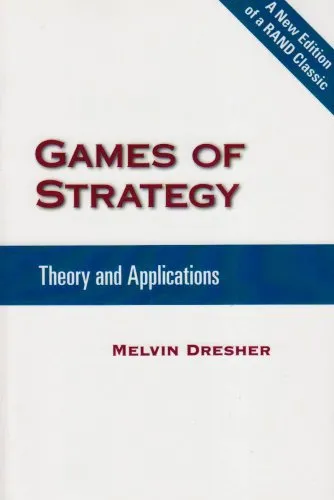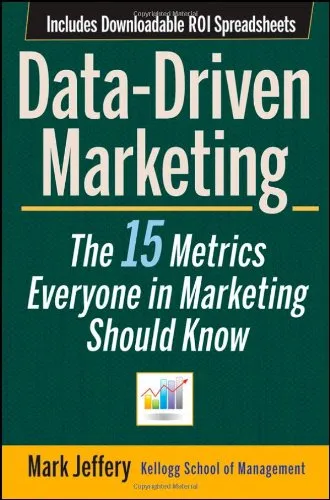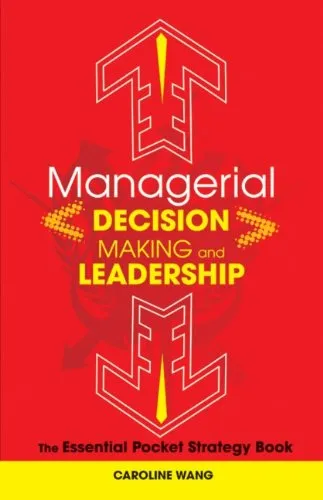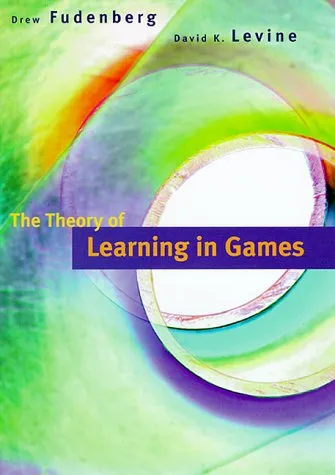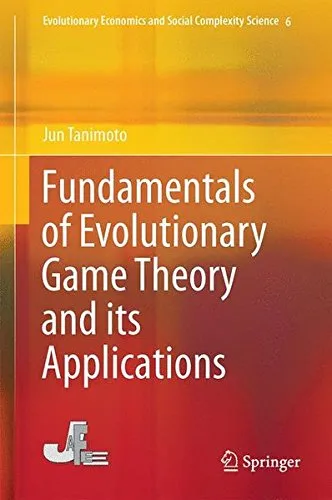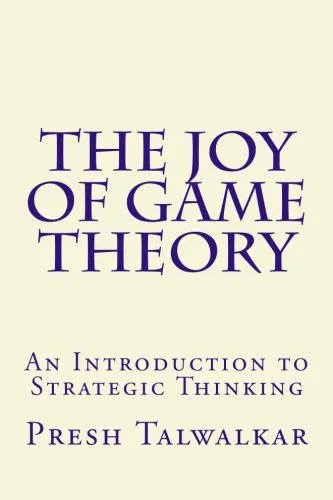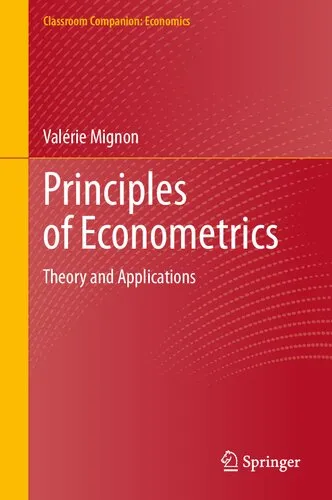Games of Strategy: Theory and Applications
3.8
بر اساس نظر کاربران

شما میتونید سوالاتتون در باره کتاب رو از هوش مصنوعیش بعد از ورود بپرسید
هر دانلود یا پرسش از هوش مصنوعی 2 امتیاز لازم دارد، برای بدست آوردن امتیاز رایگان، به صفحه ی راهنمای امتیازات سر بزنید و یک سری کار ارزشمند انجام بدینRelated Refrences:
مقدمهای بر کتاب "Games of Strategy: Theory and Applications"
کتاب "Games of Strategy: Theory and Applications" نوشتهی Melvin Dresher، یکی از آثار برجسته در حوزهی نظریه بازیها است که به تحلیل تصمیمگیریهای استراتژیک در شرایط مختلف میپردازد. این کتاب جنبههای ریاضی و کاربردی نظریه بازیها را با زبانی ساده و در عین حال تخصصی به مخاطبین معرفی میکند.
خلاصهای جامع از کتاب
کتاب "Games of Strategy" با تمرکز بر معرفی مفاهیمی مانند Equilibrium، Dominant Strategy، و Nash Equilibrium، ساختاری دقیق و منطقی را ارائه میدهد. Melvin Dresher در این کتاب تلاش میکند که نظریه بازیها را هم در قالب فرمولها و هم از منظر کاربردهای واقعی در حوزههای اقتصاد، علوم سیاسی، و حتی زندگی روزمره توضیح دهد. مخاطب با مفاهیم اصلی بازیهای تقابلی، بازیهای هماهنگی، بازیهای مشارکتی و غیرمشارکتی آشنا میشود و تحلیلهای دقیقتری از رفتارهای استراتژیک ارائه میگیرد.
این کتاب مطالعه چگونگی تعامل افراد و سازمانها را در موقعیتهای مختلف امکانپذیر میسازد و به گونهای طراحی شده است که نیازهای آموزشی و حرفهای خوانندگان را پاسخ دهد. همچنین تمرکز اصلی این کتاب بر ارائهی ابزارهایی است که بتوانند تصمیمگیریهای پیچیده را سادهتر کنند و راهکارهایی موثر جهت رسیدن به تعادل یا شرایط بهینه ارائه دهند.
نکات کلیدی (Key Takeaways)
- درک مفاهیم بنیادی از جمله Payoffs، Strategies و Game Trees.
- آشنایی با کاربردهای نظریه بازیها در اقتصاد، سیاست و تجارت.
- بررسی دقیق مفاهیم Nash Equilibrium و Pareto Efficiency.
- نحوه تحلیل بازیهایی با اطلاعات کامل و ناقص.
- شناخت بازیهای صفر جمع و فراتر از آن.
نقلقولهای معروف از کتاب
"Strategy is not just about winning, it’s about understanding the game and making better choices."
"Every interaction in life can be seen as a game, where participants strive to maximize their outcomes."
چرا این کتاب مهم است؟
این کتاب به دلایل زیر یکی از منابع ارزشمند در زمینه نظریه بازیها محسوب میشود:
- ارائه ترکیبی از مفاهیم نظری و مثالهای عملی که فهم مطالب را آسانتر میکند.
- تطبیق مفاهیم نظری با چالشهای واقعی اقتصادی و اجتماعی.
- آگاهیبخشی در مورد تصمیمگیریهای جمعی و فردی با رویکردهای متفاوت.
- استفاده از زبانی روان برای توضیح موضوعاتی که به طور معمول پیچیده و سنگین تلقی میشوند.
Introduction to 'Games of Strategy: Theory and Applications'
Written by Melvin Dresher, 'Games of Strategy: Theory and Applications' delves into the thought-provoking realm of game theory, its foundations, and its impact on decision-making processes. This book serves as a comprehensive resource for anyone seeking to understand and apply strategic thinking in a wide array of disciplines, including economics, politics, biology, and beyond.
The book effectively bridges the gap between theoretical concepts and real-world applications, ensuring that readers can connect abstract principles of strategy to practical situations. Featuring a careful balance between intuition and mathematics, this book caters to both beginners exploring game theory for the first time and seasoned strategists looking to refine their expertise.
A Detailed Summary of the Book
At its core, 'Games of Strategy: Theory and Applications' revolves around one overarching theme: strategic interaction. The book begins with a foundational exploration of game theory, interrogating how rational individuals make decisions when their choices depend on the actions of others. With the groundwork laid, it dives into various types of games, strategies, and equilibria that define this field of study.
Melvin Dresher categorizes games into two primary types: cooperative and non-cooperative. Cooperative games focus on forming coalitions and achieving mutually beneficial outcomes, while non-cooperative games are marked by individual players pursuing their own interests. Extensive discussions of Nash Equilibrium, zero-sum games, and mixed strategies are presented with clear illustrations and examples.
In subsequent chapters, the book emphasizes dynamic games, signaling, and repeated games, exploring how trust, reputation, and long-term considerations influence decisions. Dresher also introduces real-world examples drawn from economics, politics, science, and social settings to contextualize theoretical models. By the end, readers are equipped with an arsenal of tools to analyze and tackle strategic dilemmas in a variety of scenarios.
Key Takeaways
- Understanding the core principles of decision-making through the lens of strategy and rationality.
- Learning how to identify and model different types of games, from zero-sum to cooperative games.
- Mastering concepts like Nash Equilibrium, Pareto Optimality, and dominant strategies.
- Applying game theory to real-world problems, including negotiation, conflict resolution, and economic competition.
- Interpreting strategic moves in dynamic games and repeated plays, along with the impact of reputation and signaling in decision-making.
Famous Quotes from the Book
"The essence of strategy is not just in making a move, but in foreseeing the moves of others and adapting accordingly."
"In a world of strategic interaction, what you gain often depends not only on what you do but on what others do in response."
"Game theory is not about playing games. It is a profound toolkit for understanding complex systems of human behavior."
Why This Book Matters
'Games of Strategy: Theory and Applications' stands out because it transforms a complex and abstract mathematical discipline into an accessible and practical guide. Dresher ensures that game theory is no longer confined to the halls of academia, but is a toolkit that practitioners, students, and professionals can carry into their daily lives.
The book is particularly important in today's interconnected world, where decisions made by individuals, businesses, governments, and other actors seldom exist in isolation. Understanding strategic interaction empowers readers to navigate competition, cooperation, and uncertainty across any field or industry.
This book matters because it teaches readers to think not just about their own choices, but to anticipate the choices and perspectives of others. By embracing these principles, we can better navigate negotiations, avoid conflicts, and even foster collaboration. In essence, the lessons from this book are not just about improving outcomes, but about building a more strategic and thoughtful society.
دانلود رایگان مستقیم
شما میتونید سوالاتتون در باره کتاب رو از هوش مصنوعیش بعد از ورود بپرسید
دسترسی به کتابها از طریق پلتفرمهای قانونی و کتابخانههای عمومی نه تنها از حقوق نویسندگان و ناشران حمایت میکند، بلکه به پایداری فرهنگ کتابخوانی نیز کمک میرساند. پیش از دانلود، لحظهای به بررسی این گزینهها فکر کنید.
این کتاب رو در پلتفرم های دیگه ببینید
WorldCat به شما کمک میکنه تا کتاب ها رو در کتابخانه های سراسر دنیا پیدا کنید
امتیازها، نظرات تخصصی و صحبت ها درباره کتاب را در Goodreads ببینید
کتابهای کمیاب یا دست دوم را در AbeBooks پیدا کنید و بخرید
1356
بازدید3.8
امتیاز0
نظر98%
رضایتنظرات:
3.8
بر اساس 0 نظر کاربران
Questions & Answers
Ask questions about this book or help others by answering
No questions yet. Be the first to ask!
